Why Flies are dangerous to your health
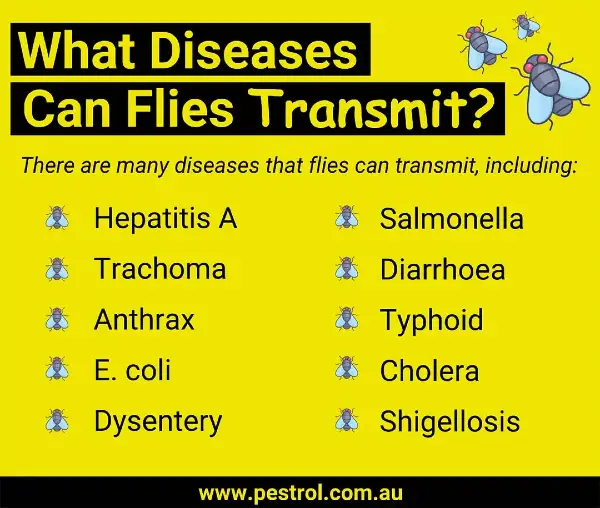
Australia is well known for being home to countless flies. It’s estimated that there are some 20,000 species of fly living on the continent, with many being yet to be described. The country provides the perfect climate for these insects to breed and flourish, and with so many varying species, flies can live in all parts of Australia, whether hot or cold, dry or wet.
Flies are very annoying insects, buzzing around people, pets and food both outdoors as well as inside. Not only are flies highly annoying, but they can also be dangerous to your health as well. In this article, we’ll take a look at just why Australian flies present potential health problems and why it’s important to keep the fly population around your home or business to a minimum to maintain a healthy and hygienic environment.
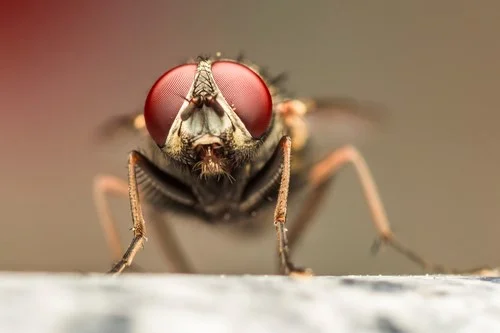
Why Flies Can Be a Health Risk
Flies are known to carry pathogens and diseases and are not the cleanest insect on the planet due to the kinds of places flies tend to congregate. If you think about the flies you’ve seen over the years, you’ll likely recall seeing them all over farm animals, mud, animal faeces, rotting meat and other foods, the garbage of all kinds, dirty drains and all sorts of other unhygienic places.
The very fact that just about every species of fly in the country tends to be attracted to environments like those listed above automatically makes them a major health risk.
When a fly comes into your home and lands on your food or kitchen benchtop, you have no idea what kind of filth it may have just come from, or what kinds of disease, bacteria or pathogens it may be carrying with it. Chances are your body’s natural immune system will keep you protected, but there’s always the possibility that the presence of one or more flies in and around the home could make someone sick.
The other problem that flies present is they are notorious breeders. You might have a few flies hanging around your house and yard, but that few can quickly transform into having hundreds or even thousands of flies setting up residence in your area.
What Flies Do When They Land On Your Food
This will sound rather disgusting, but it’s important to understand exactly what a fly does when it lands on your food. Being grossed out will likely give people more motivation in keeping flies at bay and reducing their numbers.
Basically, when a fly lands on food or food scraps in the garbage, they regurgitate saliva on the food which then liquefies it. As flies have no teeth with which to chew, they have to slurp their food through a trunk-like mouth. In order to do this, they must first turn solid food into a liquid so they are then able to drink it. That’s just how a fly feeds and needs to do this for survival. Essentially, this saliva is like fly vomit, which is a pretty gross thing to have to contaminate your backyard barbecue banquet.
As mentioned earlier, flies also love to buzz around and land on all manner of disgusting things, and specimens of these can then be transferred to the food they land on in your home. Imagine a fly that’s just been all over some animal faeces, and then it happens to land on your steak or your sandwich. Not only will it likely leave behind some tiny bits of faeces, but it’ll also vomit on your steak or sandwich in order to be able to feed.
Flies also love to lay their eggs in rotting food, especially meat, which can then lead to infestations of maggots.
All this sounds quite disgusting because it is.
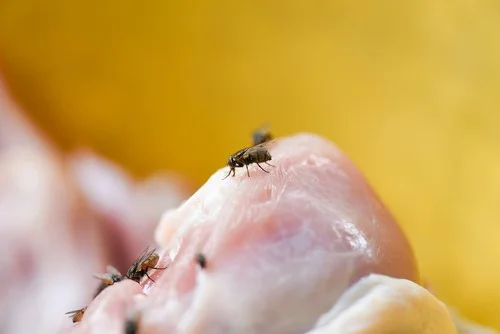
What Diseases Can Flies Cause In Australia?
Worldwide, the common housefly can spread around 65 different diseases, which makes the somewhat innocuous-looking fly more dangerous than any other insect, including the mosquito. Other flies also have the ability to bite, such as the March fly.
So, what types of diseases can the Australian species of fly spread to humans?
Possibly one of the more common diseases spread by Australian flies is Hepatitis A. This viral disease is more often spread when the fly lands on a cut or abrasion on the person’s face or body.
Bush flies can transmit trachoma to people as they are attracted to the salty tears in a person’s eyes, which is why bush flies are notorious for buzzing around a person’s face and particularly the eyes. Bush flies have the capacity to spread the disease by landing on an infected person, then landing on or around the eyes of an uninfected individual.
Food poisoning is another common ailment flies can be responsible for. This is generally the result of the fly transmitting some bit of filth onto your food, plates or utensils, which then gets into your stomach and makes you ill.
House flies and blowflies can distribute all sorts of bacteria and pathogens to Australians that can lead to potential illness, so it’s vital to control the fly population around your home or business.
Tips To Prevent Fly Infestations
To keep flies outside of your house, it’s important to install both window and door screens to reduce the number of flies finding their way inside when you want to have doors and windows open.
Also, be sure to keep all rubbish closed off to fly access and generally keep your home and yard free from anything that will attract flies in the first place.
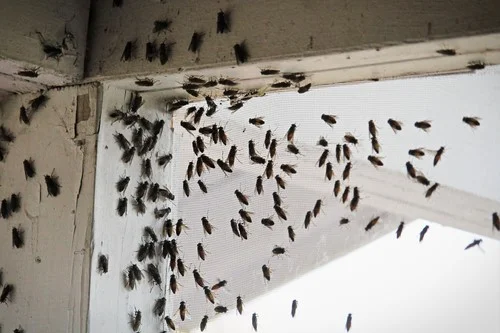
Read more about how you can get rid of flies
In Conclusion
Flies need to be controlled and eradicated so they cannot spread disease and pathogens in and around your home or business. If in doubt, get in touch with a pest control expert.
How can Pestrol help with your fly problem? View some of our solutions below.
Sources:





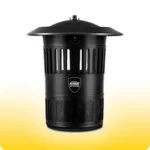 Mosquito Traps
Mosquito Traps